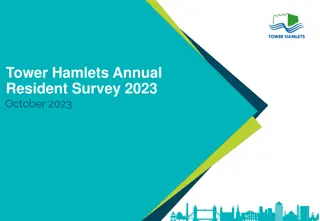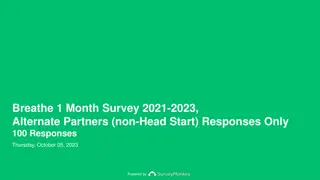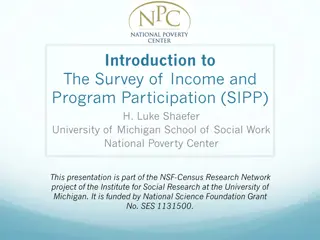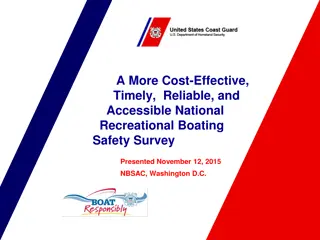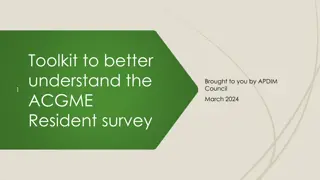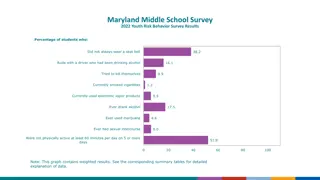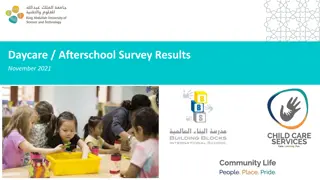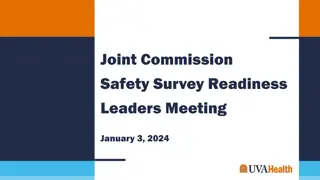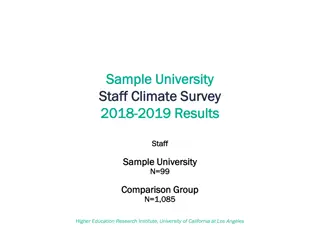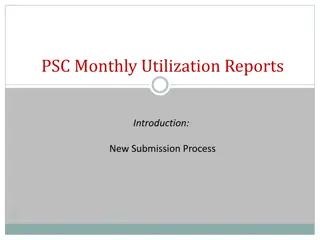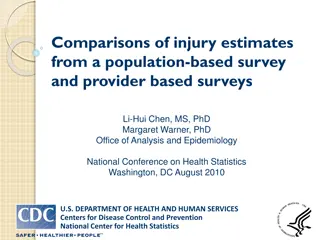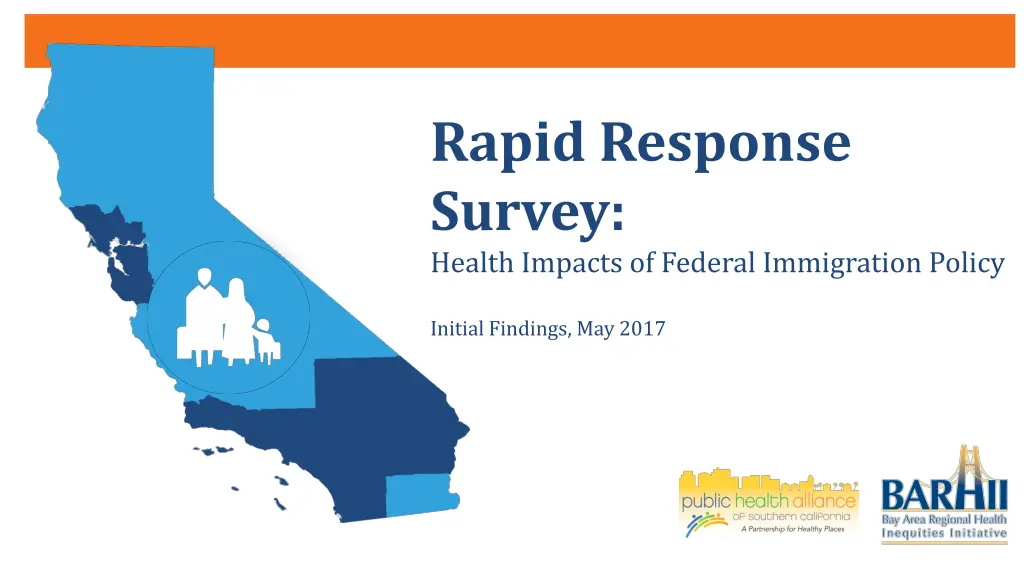
Impact of Federal Immigration Policy on Health: Survey Findings May 2017
Explore the initial findings of a rapid response survey on the health impacts of federal immigration policy conducted in May 2017. Discover the effects on housing, jobs, healthcare, mental health, and more amidst changing national conversations and increased uncertainty.
Download Presentation

Please find below an Image/Link to download the presentation.
The content on the website is provided AS IS for your information and personal use only. It may not be sold, licensed, or shared on other websites without obtaining consent from the author. If you encounter any issues during the download, it is possible that the publisher has removed the file from their server.
You are allowed to download the files provided on this website for personal or commercial use, subject to the condition that they are used lawfully. All files are the property of their respective owners.
The content on the website is provided AS IS for your information and personal use only. It may not be sold, licensed, or shared on other websites without obtaining consent from the author.
E N D
Presentation Transcript
Rapid Response Survey: Health Impacts of Federal Immigration Policy Initial Findings, May 2017
Policy Context Rapidly Changing National Conversation Increased Uncertainty Stepped up ICE Enforcement Reports of ICE at Health/Social Service Locations Proposals for Border Wall Threats to Sanctuary City Funding Muslim/Refugee Ban Xenophobic/Racist Violence
Alliance/BARHII Actions Program Participation Data Analysis (WIC, etc.) Interviews with Immigrant Serving Organizations Rapid Response Survey
Survey Goals Rapid, Policy-Driven Data Collection Build on Staff Knowledge and Experience with the Community Share Alliance/BARHII Efforts Results Inform: Internal Practice Policy Advocacy
Limitations Meant as a initial, rapid, qualitative assessment Not a scientific representative sample Convenience survey with self- selected participation Will be accompanied/followed by quantitative analysis
Responses Program Types N=157 Social Services Clinical WIC CALWorks and Employment CALFresh CPS Homelessness Clinics/FQHCs Pediatrics Medi-Cal Public Health Mental Health Lead Drug and Alcohol Epidemiology Family Health/Maternal Health Immunizations Needle Exchange STD/HIV Rape Crises Community Partners N=50 N=50
Results: Combined Have you witnessed or heard from clients that they have been impacted by the new immigration and refugee policy, enforcement and public discussion since November 2016 in the following ways: At risk of losing other necessities 12% At risk of losing housing 14% At risk of losing jobs/wages 19% At risk of losing healthcare 26% Drops in program utilization or participation 30% Afraid to travel (by car, transit, or plane) 31% Afraid to leave the house or neighborhood 33% Family members at risk of detention and deportation 43% Increased fear, stress, or other mental and emotional health impacts 55% Afraid to continue or sign up for public programs, services, and/or 58% 0% 10% 20% 30% 40% 50% 60% 70%
Results by Region Have you witnessed or heard from clients that they have been impacted by the new immigration and refugee policy, enforcement and public discussion since November 2016 in the following ways: 12% At risk of losing other necessities 11% 20% At risk of losing housing 12% 24% At risk of losing jobs/wages 18% 24% At risk of losing healthcare 26% 44% Drops in program utilization or participation 25% 48% Afraid to travel (by car, transit, or plane) 26% 56% Afraid to leave the house or neighborhood 26% 46% Family members at risk of detention and deportation 41% 62% Increased fear, stress, or other mental and emotional health impacts 52% 66% Afraid to continue or sign up for public programs, services, and/or 56% 0% 10% 20% 30% 40% 50% 60% 70% Southern California Northern California
What Are We Hearing- Accessing Services A patient told me she was afraid of going back to county clinic. She feels fearful that because we are a government entity we will turn in her information and illegal status to immigration authorities. Not only has she stopped seeing our clinic, her specialist, but also she is reluctant to take her daughter to the Pediatrics department for the same reason. Her daughter who is only 3 has had a history of abnormal blood work, was set up to see a specialist for possible leukemia and is recently fainting. I received a call from a client whom is a single mother with 2 children. The client called to request cancellation of CalFresh benefits for her children, stating she feared receiving benefits would create legal issues for her in the future which could result in her deportation. I informed the client her information is not shared, however client insisted we cancel her CalFresh benefits.
What Are We Hearing- Preparing for ICE I saw a patient recently at an evening clinic at a local school who was suffering from headaches. An interview and exam led me to believe these were related to stress. As we explored sources of stress for her, she revealed that neither she nor her husband are documented but their only child was born in this country and is, therefore, a citizen. Should they be deported, she has no idea how she will deal with finding care for her child who is 8 years old. . The children at our schools arrive crying because they are afraid that their parents may be picked up by ICE agents and they will not be returning to school to pick them up. Parents who are dropping or picking up their kids from our schools have reported that they won't walk towards the school if they see a patrol car in the vicinity of the school.
What Are We Hearing- Mental Health One outreach client that was actively interested in engaging in Mental Heath Services prior to the election, who is now so afraid to leave their house that they have cut off all contact with government agencies for fear of being thought of as illegal(sic) because they are "brown," and are married to someone who is in fact illegal. They are worried about drawing attention to their spouse as illegal, so they won't engage in anything that could require personal information to be shared/registered. We've been seeing more children affected emotionally by the fear that their parents or themselves will get deported. We've seen in increase in psychosomatic symptoms (i.e. sleep disturbances, headaches, stomachaches, tiredness, nausea) and anxiety/fears increase.
What Are We Hearing- Isolation and Fear I ve had several clients who do not want to come out of their homes to do simple living routines. It has become difficult to go shopping for foods that they need due to being scared that they will be subjected to racial profiling that may lead them to being held up. I have an undocumented patient who has a diagnosis that's high risk to public health. He's a day laborer and, sometimes, due to fear he'll be caught and deported, he'll forgo going to work. Lost wages render him unable to support himself and his spouse.
Data Into Action: Next Steps Suggestions?
Resources Public Health Awakened has prepared this guide for public health departments wishing to support immigrant communities: http://publichealthawakened.com/guide-for-public-health- to-protect-immigrant-rights/ The National Immigration Law Center just put together an excellent guide for health care providers which was accompanied by a recorded webinar and slides. Guide: https://www.nilc.org/wp-content/uploads/2017/04/Protecting-Access-to- Health-Care-2017-04-17.pdf Recording:https://attendee.gotowebinar.com/recording/viewRecording/5162562757 02666498/4325227337731450370/sara@humanimpact.org Slides: https://www.nilc.org/wp-content/uploads/2017/04/NILC-Health-KYR- Webinar-20170424.pdf California Health Advocates has put together these frequently asked questions: https://d3n8a8pro7vhmx.cloudfront.net/capca/pages/62/attachments/original/1494018311 /2017_05_04_CPCA_Immigrant_Patient_FAQs.pdf?1494018311 San Francisco also has made public their detailed instructions to staff in interactions with ICE: https://www.sfdph.org/dph/files/PoliciesProcedures/COM10- ImmigrationStatusInteractionsWithICE_Agents_Policy.pdf
Contacts Tracy Delaney PhD, RD, Executive Director, Public Health Alliance of Southern California. Tdelaney@phi.org Will Dominie, Policy Manager. Public Health Alliance of Southern California. WDominie@PHASoCal.org


